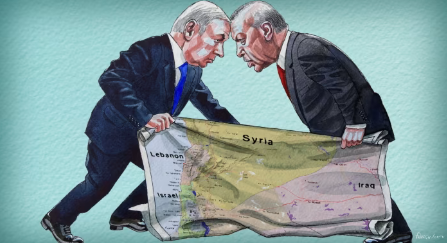
Netanyahu and Erdoğan vie for power in the Middle East as Israel and Türkiye move to exploit the vacuum left by Assad’s fall
“Among us leaders, there are only two left. Now, it’s me and Vladimir Putin.” It was with this far from modest assessment that Recep Tayyip Erdoğan referred to himself last week.
Xi Jinping and Donald Trump could question the Turkish president’s global ranking, but, at a regional level, Erdoğan has good arguments to be considered one of the two strong leaders who are transforming the Middle East. His hated rival, Benjamin Netanyahu of Israel, is the other.
Erdoğan’s current confidence comes from his actions in Syria. Turkey was the only regional power to fully support Hayat Tahrir al-Sham (HTS), the Islamist group that overthrew the Assad regime. Ibrahim Kalin, head of Turkey’s intelligence services, visited Damascus days after HTS took power.
Erdoğan has long aspired to rebuild Turkish power in the territories of the former Ottoman Empire. For him, Assad’s fall opens a new avenue for regional influence, as well as offering possible domestic benefits — weakening the Kurds in Syria, alleviating Turkey’s refugee problem and strengthening his bid for the presidency after 2028.
Türkiye’s alliances with Islamist groups such as HTS and the Muslim Brotherhood are seen as a serious threat by Israel and conservative Gulf monarchies. Israel has destroyed much of Syria’s military capacity, bombing its navy and air force, and has captured territory beyond the Golan Heights, occupied by Israel since 1967.
The Israeli government presented these actions as preventive and defensive. However, Netanyahu, like Erdoğan, sees opportunities. Last week he said: “Something tectonic happened here, an earthquake that hadn’t happened in a hundred years, since the Sykes-Picot agreement.” The reference to the 1916 agreement between the British and French, which divided the Ottoman Empire, sounds significant. With the Middle East in turmoil, advocates of a Greater Israel see a chance to once again redraw the region’s borders. Aluf Benn, from Haaretzwrote that Netanyahu “appears to seek a legacy as the leader who expanded Israel’s borders after 50 years of retreat.”
The settler movement, widely represented in Netanyahu’s coalition government, is pushing for Israel’s reoccupation of parts of Gaza. The new Trump administration may give the green light for the formal annexation of parts of the occupied West Bank. And the “temporary occupation” of Syrian lands could become permanent.
Netanyahu also sees an opportunity to confront Iran. The Islamic Republic is in its weakest position in decades, facing internal opposition and destabilized by the fall of the autocratic Syrian regime. Tehran has seen its allies — Hamas, Hezbollah and now Assad — devastated.
Iran may react to the loss of its regional allies with an accelerated effort to obtain nuclear weapons, but that could trigger an attack from Israel. Following the Netanyahu government’s successful offensive against Hezbollah in Lebanon — a campaign the Biden administration warned against — Israelis are confident and radical.
Over the past year, Israel has demonstrated the ability to fight on multiple fronts simultaneously — including Gaza, the West Bank, Lebanon, Yemen, Iran and now Syria. Israel is also the only nuclear power in the region and, for now, has almost full US support.
Netanyahu’s chances of making history as a successful leader seemed slim after the disaster of the October 7 attacks by Hamas. Controversial inside and outside Israel, he is currently on trial for corruption.
Like Erdoğan, Netanyahu is a ruthless political survivor. Both came to power decades ago and consider themselves men of destiny. However, their dreams of regional dominance face similar weaknesses. Israel and Türkiye are non-Arab powers in a majority Arab region. There is no appetite in the Arab world for a recreated Ottoman Empire, and Israel remains a foreign power in the Middle East, feared, distrusted and often hated.
Furthermore, Israel and Türkiye have too weak an economic foundation to genuinely aspire to regional dominance. The Turkish economy is devastated by inflation, and Israel, despite its technological and military prowess, is a small country with fewer than 10 million people.
The rival ambitions of Erdoğan and Netanyahu could easily collide in Syria. The country risks becoming a battleground for competing regional powers, as Saudi Arabia and Gulf countries also have interests at stake.
Last week, while the Turks celebrated the fall of Damascus and the Israelis destroyed Syrian military forces, Saudi Arabia celebrated a more peaceful achievement: being chosen as host for the 2034 World Cup.
The Saudis and Gulf states probably feel more threatened by Türkiye’s Islamic alliances than by Israel’s territorial ambitions. However, Riyadh knows that Israel’s attack on Gaza has horrified much of the Arab world. Approaching Netanyahu to block Erdoğan would be controversial, especially if the Israelis are simultaneously burying any possibility of a two-state solution with the Palestinians.
Israel and Türkiye have powerful military forces. But the Saudis, Qatar and UAE have the financial power. The path Riyadh decides to take could shape the Middle East even more profoundly than the actions of Erdoğan and Netanyahu.
By Gideão Rachman for the Financial Times*
Source: https://www.ocafezinho.com/2024/12/16/a-batalha-silenciosa-entre-netanyahu-e-erdogan-pelo-poder/

